The Prizewinner 1998
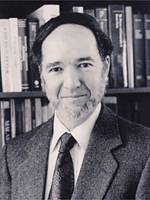
| Name | Jared Mason Diamond |
|---|---|
| Born on | 10 September 1937 |
| Nationality | United States of America |
| Title | Professor, University of California, Los Angeles, Medical School |
Reason for Awarding
Dr. Jared Mason Diamond, Professor of Physiology at the University of California Los Angeles School of Medicine, has made remarkable achievements in physiological studies on biological membranes and others, which have been recognized by election to the National Academy of Sciences. At the same time, pursuing a parallel career in such other areas as evolutionary biology and biogeography based on fieldwork, he has organized more than 15 expeditions, mainly to New Guinea, for over 30 years, and published many papers on the relationship between living things in nature, centering on birds and humans.
With the results of those field expeditions as the bases, Dr. Diamond's interest broadened and he turned his attention more and more toward global human ecology, which led him to publish the book entitled "Guns, Germs, and Steel" in 1997. Taking a long-term perspective ranging from 13,000 years ago when the ice age was finally over to the present, the book tries to elucidate the reasons why the evolution of human societies proceeded so differently on the different continents, including Asia, Americas, Europe, and Africa. Furthermore, it is a unique human history that integrates studies in many academic areas such as evolutionary biology, biogeography environmental geography, genetics, molecular biology, behavioral ecology, linguistics, and archaeology, and is attracting attention worldwide.
Recognizing that his work presented in this book are the results that have been brought about by taking a global, long-term perspective, adopting integrated methodologies, and giving fresh insights into the relationship between nature and humans, we have concluded that his achievements are surely worthy of the International Cosmos Prize.
CURRICULUM VITAE
| 1958 | B.A. Harvard, Biochemical Sciences, Summa Cum Laude |
| 1961 | Ph.D., University of Cambridge (England), Physiology |
| 1962 - 1965 | Junior Fellow, Society of Fellows, Harvard University (Biophysical Laboratory, Harvard Medical School) |
| 1968 - 2002 | Professor of Physiology, UCLA Medical School |
| 1973 - | Research Associate in Ornithology, American Museum of Natural History |
| 1985 - | Research Associate in Ornithology and Mammalogy, Los Angeles County Museum of Natural History |
| 1990 - 1993 | Vice Chair of Physiology, UCLA Medical School |
| 2002 - | Professor of Geography, University of California, Los Angeles |
Honors
| 1961 - 1965 | Prize Fellowship in Physiology, Trinity College, Cambridge, England |
| 1968 - 1971 | Lederle Medical Faculty Award |
| 1972 | Distinguished Teaching Award, UCLA Medical Class |
| 1973 | Distinguished Teaching Award, UCLA Medical Class |
| 1975 | Distinguished Achievement Award, American Gastroenterological Association (for contributions to gastroenterology) |
| 1976 | Kaiser Permanente/Golden Apple Teaching Award (best preclinical teacher) |
| 1976 | Bowditch Prize, American Physiological Society (for contributions to physiology) |
| 1978 | American Ornithologists Union, elected fellow |
| 1979 | Burr Award, National Geographic Society (for contributions to biogeography) |
| 1985 - 1990 | MacArthur Foundation Fellow |
| 1989 | Carr Medal (for outstanding contributions to knowledge of our natural heritage) |
| 1992 | Tanner Lecturer, University of Utah and many other endowed lectureships |
| 1992 | Britain's Science Book Prize (Rhone-Poulenc Prize) |
| 1992 | Los Angeles Times Science Book Prize |
| 1993 | Zoological Society of San Diego Conservation Medal |
| 1994 | Skeptics Society, Randi Award (for excellence and originality in science writing) |
| 1995 | Honorary doctor of literature, Sejong University, Korea (for contributions to understanding the Korean Hangul alphabet) |
| 1996 | Faculty Research Lecturer, UCLA |
| 1997 | Phi Beta Kappa Science Book Prize (for an outstanding contribution by a scientist to the literature of science) |
| 1998 | Coues Award, American Ornithologists' Union("For contributions to ornithology") |
| 1998 | California Book Awards Gold Medal in nonfiction |
| 1998 | Britain's Science Book Prize (Rhone-Poulenc Prize), (for the best popular nonfiction science and technology book for a general readership) |
| 1998 | Pulitzer Prize (for the best book in the category of general nonfiction) |
Publications
Books
- J. M. Diamond. The Avifauna of the Eastern Highlands of New Guineas.
Nuttall Ornithological Club monograph no.12,Boston(1972) - M. L. Cody and J. M. Diamond, eds. Ecology and Evolution of Communities.
Belknap Press, Harvard University Press, Cambridge, Mass.(1975) - J. M. Diamond and M. LeCroy. Birds of Karkar and Bagabag Islands, New Guinea. Bull. Amer. Mus. Nat. Hist. 164:469-531(1979)
- J. M. Diamond. The Avifaunas of Rennell and Bellona Islands. The Natural History of Rennell Islands, British Solomon Islands 8:127-168(1984)
- J. M. Diamond and T. J. Case. eds. Community Ecology. Harper and Row, New York(1986)
- B. Beehler, T. Pratt, D. Zimmerman, H. Bell, B. Finch, J. M. Diamond, and J. Coe. Birds of New Guinea. Princeton University Press,Princeton(1986)
- J. M. Diamond. The Third Chimpanzee. Shin-yo sha,Tokyo(1993)
- J. M. Diamond. Guns, Germs, and Steel: the Fates of Human Societies. Soshisha, Japan (in press)
- J. M. Diamond. Why Is Sex Fun? The Evolution of Human Sexuality. Weidenfeld & Nicolson,London(1997)
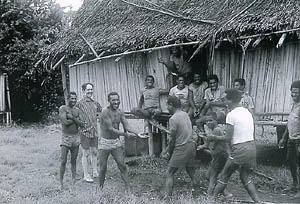 |
Dr. Jared Diamond and villagers from Kordesi Village on the Rovffaer River of Indonesian New Guinea (1990). |
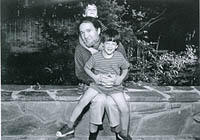 |
Dr. Jared Diamond with twin sons Max and Joshua in garden at home (1992). |
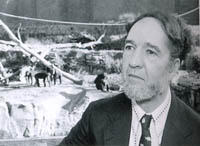 Dr. Jared Diamond being interviewed in front of the chimpanzee exhibit at the Los Angeles Zoo (1994). |
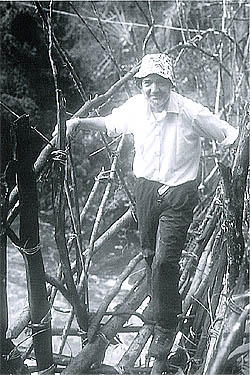 Dr. Jared Diamond crossing a native-built bridge "Jambatan Kedua" over the Okbap River Jayawijaya Mountains, Indonesian New Guinea (1993). |
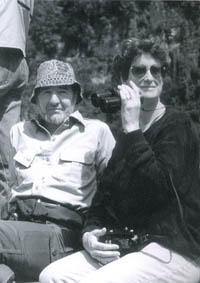 Dr. Jared Diamond and his wife Marie Cohen bird-watching in Alaska (1994). |
